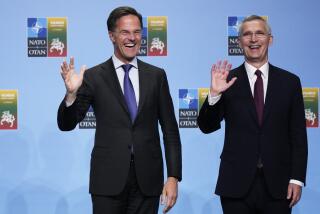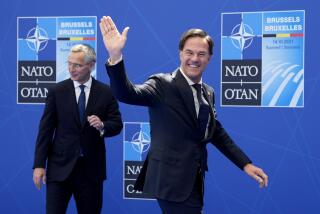Tight-Lipped NATO Irks Reporters
BRUSSELS — When the lights in the media room at NATO headquarters here went out unexpectedly one day this month, a frustrated correspondent for Voice of America radio was quick with a wisecrack: “That’s carrying the news blackout a little too far.”
Since the North Atlantic Treaty Organization’s military campaign against Yugoslavia commenced March 24, its media campaign has been marked by a dearth of information and a succession of blunders and pratfalls--many of them broadcast on live TV to a worldwide audience.
For an organization that proclaims its adherence to truth, justice and Western ideals, not only have NATO’s muddles over the past month been highly embarrassing, they have also raised questions about its honesty.
“Every day I stand up here, I give you all of the information in my possession,” Jamie Shea, NATO’s official spokesman, has emphatically assured reporters.
Many veteran NATO correspondents are glad to give the genial, mop-topped Shea more than the benefit of the doubt. But they complain that they have not been told enough about Operation Allied Force to make an informed judgment on what results, if any, the repeated airstrikes are yielding. And on the other side of the Atlantic, the Pentagon has also been stingy with the facts, prompting an angry letter from news executives to Defense Secretary William S. Cohen.
“I’d like to have my questions answered, period,” Margaret Evans, Brussels correspondent for the Canadian Broadcasting Corp., said. “I’m tired of straightforward questions being answered by a stream of rhetoric.”
And then there are the missteps. At the beginning of the campaign, alliance spokesmen announced the assassinations of Kosovo Albanian leaders who, it turned out, were alive. Pilots of two Yugoslav MIG-29s shot down over Bosnia-Herzegovina were also wrongly reported to have been captured by the allies.
Most tellingly, for five days alliance officials couldn’t get their facts straight about whether U.S. F-16s had attacked convoys of fleeing Kosovo Albanians near the Yugoslav border with Albania. (On Monday, an Air Force brigadier general, attired in battle dress, took the stage in Brussels to tell journalists that some of his pilots might have killed civilians by mistake.)
In a newspaper interview published this week in Oslo, Norwegian Foreign Minister Knut Vollebaek said something must be “seriously wrong” in the alliance’s information strategy.
“It’s unacceptable that this kind of misinformation is being released,” he told the Aftenposten daily.
In part, the alliance has simply been overwhelmed by demand. Into its functional but charmless headquarters near Brussels’ international airport have poured more than 600 journalists from all over the world, from National Public Radio to Adesmeftos Typos, a Greek daily. All are impatient and eager to know what is going on.
Just as it underestimated Yugoslav President Slobodan Milosevic’s will to resist, NATO has been visibly stretched to feed the media’s multiple needs during a war.
It has Shea--an energetic, loquacious Londoner who moonlights as a university professor of foreign affairs--as its face and bilingual (English-French) voice for the outside world.
Every day at 3 p.m. Brussels time, Shea and a NATO military spokesman give reporters, and a global audience via CNN and other cable channels, the alliance’s view of the past 24 hours.
To satisfy the demands of all the world’s newspapers, magazines and electronic media, Shea has a five-member staff.
“I realize now [that] NATO is a peacetime organization. We’re not prepared to be at war,” a member of the alliance’s hard-working but harried Press Service said, only half in jest.
Now NATO, under fire from within and without for how it is waging its bombing campaign against Milosevic, is calling up reinforcements.
Thirty more spin doctors and other media-savvy government officials from Britain and the United States have begun landing at alliance headquarters here in Belgium’s capital, NATO sources said Tuesday. Additional contingents from France, Germany and the Netherlands are expected.
“Frankly, they’re overwhelmed, and nations are offering help,” a NATO diplomat said. The British already have sent half a dozen people, including Julian Braithwaite, a subordinate of Prime Minister Tony Blair’s press secretary, Alistair Campbell.
Among others, the White House has dispatched P.J. Crowley, an Air Force colonel who is a respected spokesman for the National Security Council.
“The purpose is not spin-doctoring; it’s to help Jamie,” a British diplomat said. But NATO officials and diplomats say the recent missteps prove that they must do a more effective job keeping the Western public on their side.
In particular, NATO officials say they are concerned about the impact of official Serbian TV newscasts, picked up and retransmitted by networks in the United States and other countries, that depict suffering Yugoslavs who are still unflinching in their support for Milosevic.
“We need to be able to rebut and refute what [the Serbs] are putting out,” the British diplomat said. Added a NATO official: “We need an effective media campaign in the long haul. And it’s going to be a long haul.”
But one of the biggest problems in NATO’s imperfect media performance so far can be attributed not to Serbian craftiness, but to poor coordination between the alliance’s civilian side, represented by Shea, and the military brass, headquartered in Mons, a 45-minute drive south of Brussels.
When a military spokesman standing alongside Shea this month demanded that Serbian TV begin airing six hours of “objective” programming a day to balance the government line, or risk seeing its transmitters bombed into rubble by NATO, the alliance’s civilian officials were completely surprised.
“Another SACEUR stunt,” muttered one of Shea’s staff, using NATO shorthand for Supreme Allied Commander Europe, the title held by U.S. Army Gen. Wesley K. Clark. Many of the alliance’s media miscues, said NATO officials in Brussels, can be blamed on bad information, or a lack of information, provided by the Mons-based brass.
According to NATO insiders, Clark himself is behind the chokehold on information. The four-star general from Little Rock, Ark., has told journalists that he doesn’t intend to issue enough running data on Operation Allied Force to allow reporters, the Yugoslav government or anyone else to keep a “box score.”
Result: Nearly a month into the campaign, NATO still has not revealed how many Yugoslav tanks or artillery pieces it has destroyed in its attempt to slow down the campaign of terror against Kosovo Albanians.
There’s every likelihood that will continue, to the frustration of the hundreds of correspondents now staked out at NATO. “There are some operational things that have to be kept confidential for good reason,” Shea said Tuesday. “After all, our objective is to win this, first and foremost. . . . But within those constraints, we are doing the best we possibly can to get you the information.”
More to Read
Sign up for Essential California
The most important California stories and recommendations in your inbox every morning.
You may occasionally receive promotional content from the Los Angeles Times.










